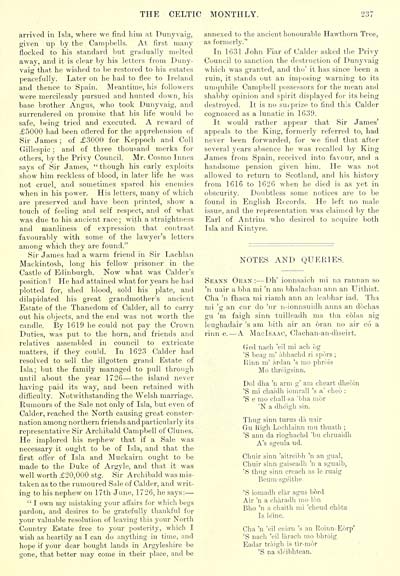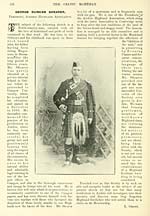Blair Collection > Celtic monthly > Volume 2, 1894
(289)
Download files
Complete book:
Individual page:
Thumbnail gallery: Grid view | List view

THE CELTIC MONTHLY.
237
arrived in Isla, where we find liim at Hunyvaig,
given up by the Cam])ljells. At first many
flocked to his standard but gradually melted
away, and it is clear by his letters from Duny-
vaig that he wished to be restored to his estates
peacefully. Later on he had to flee to Ireland
and thence to Spain. Meantime, his followers
were mercilessly pursued and hunted down, his
base brother Angus, who took Dunyvaig, and
surrendered on promise that his life would be
safe, being tried and executed. A reward of
£5000 had been oflered for the apprehension of
Sir James ; of £3000 for Keppoch and Coll
Gillespie ; and of three thousand merks for
others, by the Privy Council. Mr. Cosmo Innes
says of Sir James, " though his early exploits
show him reckless of blood, in later life he was
not cruel, and sometimes spared his enemies
when in his power. His letters, many of which
are preserved and have been printed, show a
touch of feeling and self respect, and of what
was due to his ancient race; with a straightness
and manliness of expression that contrast
favourably with some of the lawyer's letters
among which they are found."
Sir James had a warm friend in Sir liachlan
Mackintosh, long his fellow prisoner in the
Castle of Edinburgh. Now what was Calder's
position'? He had attained what for years he had
plotted for, shed blood, sold his jilate, and
dilapidated his great grandmother's ancient
Estate of the Thanedom of Calder, all to carry
out his objects, and the end was not worth the
candle. By 1619 he could not pay the Crown
Duties, was put to the horn, and friends and
relatives assembled in council to extricate
matters, if they could. In 1623 Calder had
resolved to sell the illgotten grand Estate of
Isla; but the family managed to pull through
until aljout the year 1726 — the island never
having jiaid its way, and been retained with
difficulty. Notwithstanding the Welsh marriage.
Rumours of the Sale not only of Isla, but even of
Calder, reached the North causing great conster-
nation among northern friends and particularly its
representative Sir Archibald Campbell of Clunes.
He implored his nephew that if a Sale was
necessary it ought to be of Isla, and that the
first ofler of Isla and Muckairn ought to be
made to the Duke of Argyle, and that it was
well worth £20,000 stg. Sir Archibald was mis-
taken as to the rumoured Sale of Calder, and writ-
ing to his nephew on 17th June, 1726, he says: —
' ' I own my mistaking your aftairs for which begs
pardon, and desires to be gratefully thankful for
your valuable resolution of leaving this your North
Country Estate free to your posterity, which I
wish as heartily as I can do anything in time, and
hope if your dear bought lands in Argyleshire be
gone, that better may come in their place, and be
annexed to the ancient honourable Hawthorn Tree,
as formerly."
In 1631 John Fiar of Calder asked the Privy
Council to sanction the destruction of Dunyvaig
which was granted, and tho' it has since been a
ruin, it stands out an imjiosing warning to its
umi]uhile Campbell possessors for the mean and
shabby opinion and spirit disjilayed for its being
destroyed. It is no surprize to find this Calder
cognosced as a lunatic in 1639.
It would rather appear that Sir James'
appeals to the King, formerly referred to, had
never been forwarded, for we find that after
several years absence he was recalled by King
James from Spain, received into favour, and a
handsome pension given him. He was not
allowed to return to Scotland, and his history
from 1616 to 1626 when he died is as yet in
obscurity. Doubtless .some notices are to be
found in English Records. He left no male
issue, and the representation was claimed by the
Earl of Antrim who desired to acquire both
Isla and Kintyre.
NOTES AND QURRTES.
Seann Oran : — Dh' ionnsaich mi na rannan so
'n uair a bha mi 'n am bhalachan ann an Uithist.
Cha 'n fhaca mi riamh ann an leabhar iad. Tha
mi 'g an cur do 'nr n-ionnsuidh anns an diiclias
gu 'm faigh sinn tuilleadh ma tlia e51as aig
leughadair 's am bith air an 6ran no air c6 a
rinn e. — A MaoIsAAC, Clachan-an-d'iseirt.
(ied nach "eil mi acli og
'S beag m' abhachd ri sp6rs ;
Rinn m' ardan 's mo phnMs
Mo threigsinn.
Dol dha 'n arm g' am cheart dheoin
'S mi chaidh iomrall 's a' cheu :
'S e mo chall-sa 'bha niiir
'N a dhe'igh sin.
Thug sinn turns da uair
Gu Uigh Lochlainn mu thuatb ;
'S ann da rioghachd 'Ini clu-uaidh
A's sgeula ud.
Chuir sinn 'aitreibh 'n an gual,
Chuir sinn gaiseadh 'n a sguaib,
'S thug sinn creach as le ruaig
Beumsge'ilhe
'S iomadh clkr agus bord
Air 'n a chh,radh mo Ion
Bho 'n a chaith mi 'cheud chota
Is Mine.
Cha 'n 'eil cearn 's an Roinn-Eurp'
'S nach 'eil larach mo bhroig
Eadar traigh is tir-mtSr
'S na slt'-ibhtean.
237
arrived in Isla, where we find liim at Hunyvaig,
given up by the Cam])ljells. At first many
flocked to his standard but gradually melted
away, and it is clear by his letters from Duny-
vaig that he wished to be restored to his estates
peacefully. Later on he had to flee to Ireland
and thence to Spain. Meantime, his followers
were mercilessly pursued and hunted down, his
base brother Angus, who took Dunyvaig, and
surrendered on promise that his life would be
safe, being tried and executed. A reward of
£5000 had been oflered for the apprehension of
Sir James ; of £3000 for Keppoch and Coll
Gillespie ; and of three thousand merks for
others, by the Privy Council. Mr. Cosmo Innes
says of Sir James, " though his early exploits
show him reckless of blood, in later life he was
not cruel, and sometimes spared his enemies
when in his power. His letters, many of which
are preserved and have been printed, show a
touch of feeling and self respect, and of what
was due to his ancient race; with a straightness
and manliness of expression that contrast
favourably with some of the lawyer's letters
among which they are found."
Sir James had a warm friend in Sir liachlan
Mackintosh, long his fellow prisoner in the
Castle of Edinburgh. Now what was Calder's
position'? He had attained what for years he had
plotted for, shed blood, sold his jilate, and
dilapidated his great grandmother's ancient
Estate of the Thanedom of Calder, all to carry
out his objects, and the end was not worth the
candle. By 1619 he could not pay the Crown
Duties, was put to the horn, and friends and
relatives assembled in council to extricate
matters, if they could. In 1623 Calder had
resolved to sell the illgotten grand Estate of
Isla; but the family managed to pull through
until aljout the year 1726 — the island never
having jiaid its way, and been retained with
difficulty. Notwithstanding the Welsh marriage.
Rumours of the Sale not only of Isla, but even of
Calder, reached the North causing great conster-
nation among northern friends and particularly its
representative Sir Archibald Campbell of Clunes.
He implored his nephew that if a Sale was
necessary it ought to be of Isla, and that the
first ofler of Isla and Muckairn ought to be
made to the Duke of Argyle, and that it was
well worth £20,000 stg. Sir Archibald was mis-
taken as to the rumoured Sale of Calder, and writ-
ing to his nephew on 17th June, 1726, he says: —
' ' I own my mistaking your aftairs for which begs
pardon, and desires to be gratefully thankful for
your valuable resolution of leaving this your North
Country Estate free to your posterity, which I
wish as heartily as I can do anything in time, and
hope if your dear bought lands in Argyleshire be
gone, that better may come in their place, and be
annexed to the ancient honourable Hawthorn Tree,
as formerly."
In 1631 John Fiar of Calder asked the Privy
Council to sanction the destruction of Dunyvaig
which was granted, and tho' it has since been a
ruin, it stands out an imjiosing warning to its
umi]uhile Campbell possessors for the mean and
shabby opinion and spirit disjilayed for its being
destroyed. It is no surprize to find this Calder
cognosced as a lunatic in 1639.
It would rather appear that Sir James'
appeals to the King, formerly referred to, had
never been forwarded, for we find that after
several years absence he was recalled by King
James from Spain, received into favour, and a
handsome pension given him. He was not
allowed to return to Scotland, and his history
from 1616 to 1626 when he died is as yet in
obscurity. Doubtless .some notices are to be
found in English Records. He left no male
issue, and the representation was claimed by the
Earl of Antrim who desired to acquire both
Isla and Kintyre.
NOTES AND QURRTES.
Seann Oran : — Dh' ionnsaich mi na rannan so
'n uair a bha mi 'n am bhalachan ann an Uithist.
Cha 'n fhaca mi riamh ann an leabhar iad. Tha
mi 'g an cur do 'nr n-ionnsuidh anns an diiclias
gu 'm faigh sinn tuilleadh ma tlia e51as aig
leughadair 's am bith air an 6ran no air c6 a
rinn e. — A MaoIsAAC, Clachan-an-d'iseirt.
(ied nach "eil mi acli og
'S beag m' abhachd ri sp6rs ;
Rinn m' ardan 's mo phnMs
Mo threigsinn.
Dol dha 'n arm g' am cheart dheoin
'S mi chaidh iomrall 's a' cheu :
'S e mo chall-sa 'bha niiir
'N a dhe'igh sin.
Thug sinn turns da uair
Gu Uigh Lochlainn mu thuatb ;
'S ann da rioghachd 'Ini clu-uaidh
A's sgeula ud.
Chuir sinn 'aitreibh 'n an gual,
Chuir sinn gaiseadh 'n a sguaib,
'S thug sinn creach as le ruaig
Beumsge'ilhe
'S iomadh clkr agus bord
Air 'n a chh,radh mo Ion
Bho 'n a chaith mi 'cheud chota
Is Mine.
Cha 'n 'eil cearn 's an Roinn-Eurp'
'S nach 'eil larach mo bhroig
Eadar traigh is tir-mtSr
'S na slt'-ibhtean.
Set display mode to: Large image | Transcription
Images and transcriptions on this page, including medium image downloads, may be used under the Creative Commons Attribution 4.0 International Licence unless otherwise stated. ![]()
| Early Gaelic Book Collections > Blair Collection > Celtic monthly > Volume 2, 1894 > (289) |
|---|
| Permanent URL | https://digital.nls.uk/75847079 |
|---|
| Shelfmark | Blair.55 |
|---|---|
| Additional NLS resources: | |
| Attribution and copyright: |
|
| Description | A selection of books from a collection of more than 500 titles, mostly on religious and literary topics. Also includes some material dealing with other Celtic languages and societies. Collection created towards the end of the 19th century by Lady Evelyn Stewart Murray. |
|---|
| Description | Selected items from five 'Special and Named Printed Collections'. Includes books in Gaelic and other Celtic languages, works about the Gaels, their languages, literature, culture and history. |
|---|

